- Home
- Cynthia Voigt
Building Blocks Page 2
Building Blocks Read online
Page 2
Brann crouched down to peer into the enclosure his father had built. He could crawl under the gateway, if he was careful and kept his back low, it was that big. A tower rose out of the center, with a window like a single eye in it. If Brann took that down and built up a shorter tower at each corner, then he could crawl inside the fortress.
He didn’t think about it, he just stood up to dismantle the tall tower, carefully, block by block. Then, using the same octagonal design his father had used, he built towers on each corner of the wall, where soldiers would be stationed to keep watch. The wood in his hands felt warm, as if it was touching him as much as he was touching it. It felt familiar. It should, for all the hours he’d played with these blocks.
Sarah would be home tomorrow, and she’d stay home for two weeks before she went off with the family she was going to work for, taking care of the kids for a summer on Cape Cod. She could stop the fights. She just said, “Stuff it you two. Save it for later.” So Brann could count on two weeks at peace. Brann reminded himself to go apply again for a paper route that afternoon. You had to go in about once a month, to remind them you were alive, so that when a route opened up you’d get it. With that and his grass-cutting jobs, he might earn fifteen dollars a week. By the end of the summer, he could afford a ten-speed bike—unless prices went up again. And they surely would.
Brann’s watchtowers were slender and had many windows, one at each place where the stairs would turn, if there were real stairs inside. He made crenellated tops to them, so the archer sentry could fire off warning shots. Crossbows, he corrected himself; these soldiers would be armed with crossbows. His father’s tower had had solidity and grace, both. Brann’s towers didn’t look the way they had looked in his imagination. They never did. His father knew without thinking what shape belonged where, and how wide the base had to be for it to narrow up to the right-sized top. Brann’s father would have built these towers slowly, but Brann was a fast worker.
His father knew a lot of things, like how to build cabinets and put in electric wiring. He just didn’t do things—except the lousy draftsman job where he’d always worked, an architectural factory he called it, a long room with tables in it, and everybody drawing on them at once. Other men quit or got promoted, but not Brann’s father. He didn’t try for things. He didn’t even stick up for things.
About the only thing Brann knew his father had stuck up for, had demanded and gotten, was the naming of Brann. Brann’s mother told the story, and Brann could never tell how she felt about it. She was used to getting her own way, but Brann suspected she liked having his father win an argument, because she only told the story when she was feeling good.
Before Brann was born, they’d decided that he should be named after his father’s side of the family. If he was a boy he’d be Thomas, after his father’s father. If he was a girl, he’d be Rebecca of course. But he was a boy and his dad was sitting beside his mother in the hospital when they brought him in—eight pounds eleven ounces, screaming for food; with a head of red hair, they said, waving his arms and legs, and completely out of temper with the world. The nurse brought the birth certificate to fill out. His father suddenly said, “Brann, with two n’s.”
“What?” his mother had said. She put all the surprise in her voice very time she told the story. “What was I to think?” she would ask them, “a child of mine who was supposed to have the perfectly sensible name of Thomas turned into something you’d expect to find in a supermarket, next to Whole Wheat or All-Purpose.” Remembering, Brann grinned—he liked the way his mother told stories.
“That’s his name,” his father had said.
“What do you mean? What about Thomas?”
Meanwhile, baby Brann was howling away. They were ignoring him.
“I don’t know. It just—came to me. No, honestly, Di, I don’t know. But that’s his name. I choose it. No arguments, not about this.”
His mother said she flapped her mouth a couple of times, then gave in. “I was still pretty weak,” she said. “He took advantage of my weakness.”
Brann wasn’t sure how he felt about her giving in. He always introduced himself, Brann with two n’s Connell. It was an odd name, and he didn’t like that. Teachers always asked him what kind of name it was, and he would say what his father said, “It’s Irish.” But it sure was unusual, and Brann liked that. He also liked his father arguing up for it.
The towers were finished. He sat back on his heels to study the effect. In general it was all right, but the towers didn’t rise high enough. They couldn’t be any higher, but they could look higher. His dad would know how to do that.
Brann crawled inside the fortress. There was room to sit cross-legged in it, even room to curl up on the floor. He heard footsteps overhead. Somebody looking for him. Let her look, let him look. If they didn’t care any more about him than to ruin the first day of his vacation with that kind of fighting—let them worry. Serve them right. He had enough worries just being alive without adding their problems to it and having to listen and wishing his father would just tell her to shut her mouth. But his father never did that, and he never would do that, because Brann’s mother was right about it all, right about everything. Except marrying his father.
Brann curled up a little more tightly, careful not to knock against the wall with his bare feet, and fell asleep.
Two
It was dark when Brann woke up. Somebody must have come down and turned off the light. There wasn’t even (he peered through the broad gateway which led into his father’s fortress) a line of light under the door to the laundry room. He wondered how long he’d slept there on the cool cement floor.
(The floor wasn’t cool, wasn’t cement.)
He could see the vague shape of the fortress gateway even here in the absolute night of the windowless cellar room.
(The floor was wood.)
Brann jerked awake and sat up without thinking. Around him, building blocks exploded, clattered and banged on a wooden floor. That was strange. He must still be asleep.
He heard a movement across the darkness, like sheets rustling, or a mattress creaking. He looked in that direction.
A window gleamed under a night sky. So he was dreaming he was in a room. He could see the top branches of a tree, black against the sky. The branches swayed slightly, in leafy moonlight. Brann’s eyes grew accustomed to the dim light. He looked around the room: a bureau with a mirror on top of it, a door opposite the window, a bed beside the window, and a boy sitting up in the bed, staring at him. What kind of a dream was this? The boy’s hair was cropped short and he had a long face, pale in the moonlight, with dark eyes in the middle of it. The boy stared and stared at Brann. Brann stared and stared back, waiting for the dream to take its direction.
Nothing happened.
The silence mounted. Brann moved cautiously to pinch himself, hard. It hurt.
But it shouldn’t hurt—when you pinched yourself in dreams it wasn’t supposed to hurt. And in dreams you couldn’t move your body the way you usually could. As soon as he thought of that, Brann stood up.
If he was awake, what was going on? He couldn’t be awake.
“Who are you?” the boy in the bed asked. He didn’t move. “Where did you come from?” His voice was low and whispery, scared.
“New York,” Brann said. His own voice sounded high and squeaky. He jammed his hands into his blue-jean pockets. You could dream you were awake. He’d done that. “Where do you come from?”
“I live here,” in the same voice. “What are you doing in my room?”
“I fell asleep.” Brann whispered too. “Why are you whispering?”
“My grandparents are down the hall. Grandma sleeps lightly. I’m surprised you didn’t wake her up knocking over the blocks. How’d you get into our house?”
Brann shrugged. Really, it had to be a dream. It would explain itself, sooner or later. He waited to see what the frightened little kid would do next.
“What’s your name?”
“Are you a burglar?”
Brann decided to take the offensive in this conversation. “Are you scared of burglars?”
“No.” The boy shook his head. “My father would take care of them good. Besides, we haven’t got anything to steal. Unless they’re tramps and just hungry—but then they’d stick to the kitchen, if they got in.” He was a skinny kid, and little in his bed.
“How old are you?” Brann asked.
“Ten. Almost ten-and-a-half. How old are you?”
“Twelve.”
“You’re going into the seventh grade. I bet you can do long division.”
“Easy,” Brann said. “That’s kid stuff. At my school we have to learn everything, like all the Presidents—”
“I know who the President is, it’s Roosevelt. Franklin Delano Roosevelt again. My father voted for him, both times. My mother didn’t the first time but she did last fall. Who did your father vote for?”
“I don’t know,” Brann lied. He was busy remembering Social Studies classes: if it was Roosevelt and his second term, it had to be the Depression. This was about the weirdest dream he’d ever had. If there was a weird dream contest, this one was a sure winner. He did know who his father had voted for: McGovern. His father had backed the loser.
“Do you know how many states there are?” the boy asked.
“Fifty.”
“Nope, forty-eight. What’s the capital of this state?”
“Albany,” Brann said.
“Nope, Harrisburg.”
Harrisburg? But Harrisburg was the capital of Pennsylvania. Now Brann knew a little more, like another block put into place. The boy sat on his bed looking smug. “What’s the capital of California?” Brann asked.
“San Francisco?”
“Naw, Sacramento. Connecticut?”
“New Haven.”
“No, Hartford.” The kid didn’t look smug any more. “Anyway, what’s your name?”
“Kevin. What did you say yours was?”
“Brann with two n’s.”
“That’s a funny name.”
“It’s Irish,” Brann explained.
“My father’s part Irish,” the boy said. “Do you want to come over and sit on the bed? You still haven’t said what you’re doing here. You can’t stay anyway, if he catches you. Don’t knock over any more blocks. What are you doing here?”
“Waiting to wake up,” Brann answered. He picked his way carefully among fallen blocks. The bed creaked when he sat on it.
Kevin studied him, like a mouse looking at a snake. Brann wondered what the dream was going to be about. “Are you a runaway? I’ve read about runaway kids, but the papers say they go in gangs. That was a joke, wasn’t it? About waking up? Want me to pinch you?”
Brann nodded, and the boy pinched him gently on the arm. “Harder,” Brann said. But it was no use. He was dreaming he was awake in Pennsylvania somewhere, during the Great Depression. He didn’t feel like he was dreaming, he felt like he was awake. But that was impossible. “Never mind,” Brann said. He was asleep. He had to be. Impossible things didn’t happen. “What time is it?”
“Late,” the boy said. “You can’t stay here.”
“I know,” Brann said. “You don’t have to tell me that. I don’t want to anyway.” He heard two long whistles, like boat signals. But Pennsylvania didn’t border on the ocean.
“I don’t know what my father would say—he’d probably whip you or turn you over to the police, or both. He’d whip me too. He has a belt. It hurts; nothing hurts as much. So you’ve got to go.”
“Is the ocean near here?” Brann asked. Sometimes in dreams you couldn’t wake yourself up, no matter how hard you tried. You had to wait for things to get scary enough to wake you up. But he wasn’t scared. If anyone was scared it was this Kevin kid, huddling in the bed with his sheet pulled up to his shoulders.
“The river, the Ohio River. I’ve never seen the ocean.”
“How am I supposed to get out?” Brann asked.
“How’d you get in?”
“I flew in the window,” Brann said. He giggled. In dreams wasn’t that how you traveled, with your arms spread out, floating? “So I’ll just fly out.” That would prove it for sure.
“That’s not funny,” the boy said. “Did you come up the back stairs to the second floor and then up here? It’s lucky you came to my room. If Grandma had seen you—she’s old and her heart’s not good. Grandpa is deaf, so nothing bothers him. Can you find your way down all right?”
“No,” Brann said. “Because I didn’t come in, come up.” He was beginning to get scared. He tried to keep fear out of his voice, but the boy heard it.
“You’ve done something wrong, haven’t you?” Kevin asked. Brann shook his head, then nodded it. He didn’t know. “And you don’t want to talk about it.”
Brann nodded again. How could he say, I fell asleep and when I woke up I wasn’t where I’d been to fall asleep, and I think this is all a dream but it feels too real to be a dream. If it isn’t a dream that means I’ve maybe traveled through time; but that’s impossible.
Kevin’s eyes took in everything about Brann. “Well,” he finally said, “I could take you out to the garage. You could sleep there. Maybe you could have breakfast with us. If you wanted to. Anyway. But you better think up a good story, because my mother is pretty sharp with strangers. If she thinks something’s fishy, I’ll tell her just what happened. I don’t want to get whipped.”
“OK,” Brann said. Dreams could seem awfully real, he reminded himself.
They slipped off the bed. Kevin was sleeping in his underpants, just like ordinary kid. Brann pushed his feet down on the floor so hard the contact jarred up his ankles; but he still didn’t wake up.
Kevin moved silently across the room and Brann followed as silently on bare feet. The boy opened the door and looked out. A light went on. With one hand Kevin pushed Brann back into the room. “Don’t move,” he hissed, as if their lives depended on it. Brann stood with his back flat against the wall, his heart beating in his ears, listening.
He heard shuffling footsteps, then an airy voice: “Kevin? Is that you? I thought I heard voices.”
Kevin stepped out into the hallway. “It’s just me, Grandma.”
“I heard a noise, and then voices. But I thought I might be dreaming and you know how they go on if I wake them up. I listened. I tried to go back to sleep. It was whispering. Did you hear whispering?” The voice sounded urgent.
“I heard it, Grandma, don’t worry. It was me. I got up and ran into the blocks. I knocked the whole building down, then I was talking to myself.”
“Why?”
“It was dark. I was lonely. I’m going downstairs now and get a glass of water so you’ll hear that. I’ll be coming upstairs again, so you’ll hear that too. Don’t worry.”
The two voices were receding, as if the speakers were walking away.
“I have never walked in my sleep,” the airy voice declared.
“I know, Grandma.”
“Nor snored.”
“Well now, I don’t think that’s true.”
“I knew you’d tell the truth. You’re a good boy, Kevin.”
“I’m going to turn out the hall light.”
“That’s nice.”
Brann waited a brief moment in darkness, then stepped into the doorway. Kevin grabbed his arm and they moved together down a dark hall. “Stairs,” Kevin whispered into Brann’s ear, “eighteen.” He kept a light grip on Brann’s arm.
Brann stepped out into the darkness and counted eighteen steps down, bare wood. On the lower floor the hallway was carpeted. Kevin crept along the hall at a snail’s pace, his hand now painfully tight on Brann’s arm.
“Down ten, then a landing, down another twenty.” The words were breathed into Brann’s ear. Brann could feel the tenseness in the boy’s body.
But why was Kevin scared? It was his own house. Kevin was more scared even
than Brann, and Brann was moving around in darkness in a place he’d never seen before.
They crossed the ground floor. Brann saw dark, hulking shapes of furniture, dark doorways, and lighter window panes. He didn’t think, he just followed the boy beside him. They stepped out onto a small porch and down five steps to a cement walk. It was lighter outside, and Brann saw Kevin’s face white in the moonlight.
“Grandma’s getting senile,” Kevin said. “It was after her stroke last winter. But it scares her when she can’t remember things, or hears things that aren’t there. It scares her when there’s—an uproar. It’s dangerous for her to be scared because if she has another stroke she’ll probably die.”
“My grandfather got senile,” Brann said, to show that he sympathized. “But I never knew what it meant. I was too little, and they put him in a home. Your grandmother doesn’t seem bad. I wonder why they put my grandfather away?”
“Away?”
“In a nursing home. They didn’t let kids visit. I can’t remember him at all. I only ever had one grandmother.”
“Why?”
“My other one, my father’s mother, died when he was young.”
The night was warm, with a faint breeze to rustle the leaves of the trees. The humidity was high so the air hung close.
“That’s the garage. There’s a side door.”
“Is it locked?”
“Why should it be locked?”
A long, hooting sound slid through the dark air, coiling like a snake. Then Brann heard the train rushing along behind it. “Are you coming with me?”
Kevin shook his head. He was scared to go with Brann. He was littler than Brann, so Brann tried to be understanding; but he didn’t feel understanding. Brann didn’t want to go on alone into that dark place. He didn’t want to be left alone. “What about tomorrow?” he asked, to keep the other boy’s company a little longer.

 The Runner
The Runner By Any Name
By Any Name Bad Girls, Bad Girls, Whatcha Gonna Do?
Bad Girls, Bad Girls, Whatcha Gonna Do?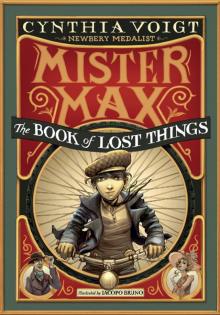 Mister Max: The Book of Lost Things: Mister Max 1
Mister Max: The Book of Lost Things: Mister Max 1 The Wings of a Falcon
The Wings of a Falcon Bad Girls in Love
Bad Girls in Love Toaff's Way
Toaff's Way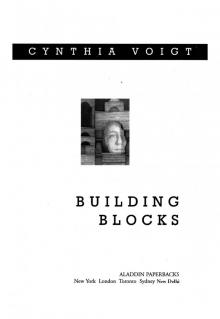 Building Blocks
Building Blocks Orfe
Orfe Tell Me if the Lovers Are Losers
Tell Me if the Lovers Are Losers It's Not Easy Being Bad
It's Not Easy Being Bad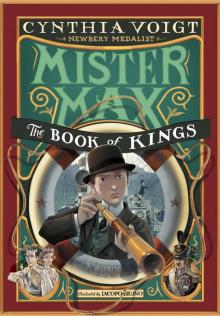 The Book of Kings
The Book of Kings Dicey's Song
Dicey's Song A Solitary Blue
A Solitary Blue Tree by Leaf
Tree by Leaf Sons From Afar
Sons From Afar Teddy & Co.
Teddy & Co. Jackaroo
Jackaroo Elske
Elske Izzy, Willy-Nilly
Izzy, Willy-Nilly Come a Stranger
Come a Stranger Mister Max: The Book of Secrets: Mister Max 2
Mister Max: The Book of Secrets: Mister Max 2 Seventeen Against the Dealer
Seventeen Against the Dealer The Callender Papers
The Callender Papers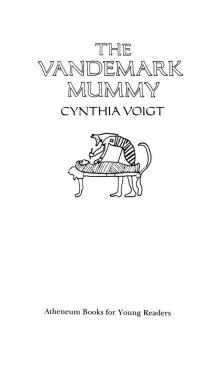 The Vandemark Mummy
The Vandemark Mummy Tale of Birle
Tale of Birle Glass Mountain
Glass Mountain The Tale of Oriel
The Tale of Oriel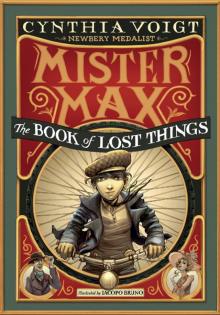 The Book of Lost Things
The Book of Lost Things The Book of Secrets
The Book of Secrets Tale of Gwyn
Tale of Gwyn